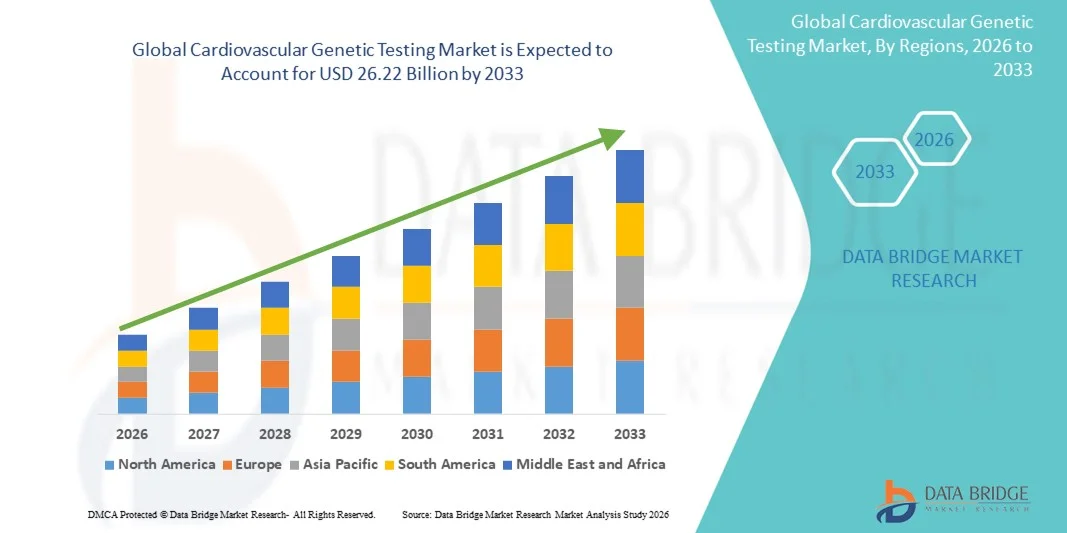Global Cardiovascular Genetic Testing Market
市场规模(十亿美元)
CAGR :
% 
 USD
11.21 Billion
USD
26.22 Billion
2025
2033
USD
11.21 Billion
USD
26.22 Billion
2025
2033
| 2026 –2033 | |
| USD 11.21 Billion | |
| USD 26.22 Billion | |
|
|
|
|
全球心血管基因檢測市場細分,按疾病(遺傳性心肌病變、肥厚型心肌病變 (HCM)、擴張型心肌病變 (DCM)、心律不整、主動脈病變及其他)、技術(細胞遺傳學檢測、生化檢測和分子檢測)、檢測類型(預測性檢測、攜帶者檢測、產前和新生兒檢測、診斷性檢測、藥物基因組學、基因組檢測及基因組學(基因學、30)、基因學和年的預測
心血管基因檢測市場規模
- 2025年全球心血管基因檢測市場規模為112.1億美元 ,預計 2033年將達262.2億美元,預測期內 複合年增長率為11.20%。
- 市場成長主要得益於人們對遺傳性心血管疾病認識的不斷提高、基因檢測技術的進步以及精準醫療方法在臨床實踐中的應用,從而帶來更加個性化的患者護理。
- 此外,醫療服務提供者和患者對早期檢測、風險評估和個人化治療策略的需求不斷增長,使得心血管基因檢測成為預防心臟病學的重要組成部分。這些因素共同推動了基因檢測解決方案的普及,顯著促進了該行業的成長。
心血管基因檢測市場分析
- 心血管基因檢測能夠提供關於遺傳性心臟病和心血管疾病易感性的信息,由於其能夠實現早期檢測、風險分層和有針對性的干預,因此正日益成為個人化醫療和預防心臟病學在臨床和研究應用中的關鍵工具。
- 心血管基因檢測需求的成長主要受以下因素驅動:人們對遺傳性心臟病的認識不斷提高、基因組技術的進步以及精準醫療方法在常規醫療實踐中日益普及。
- 北美在心血管基因檢測市場佔據主導地位,預計2025年將佔據42.9%的最大收入份額。北美地區的特點是醫療保健支出高、早期採用先進的基因技術以及主要行業參與者的存在。在美國,家族性高膽固醇血症、心肌病變和心律不整相關遺傳疾病的檢測普及率顯著提高,這得益於成熟診斷公司和新興生物技術新創公司的創新。
- 由於人們對基因檢測的認識不斷提高、心血管疾病盛行率不斷上升以及醫療保健基礎設施不斷完善,預計亞太地區將在預測期內成為心血管基因檢測市場成長最快的地區。
- 預測性檢測領域在心血管基因檢測市場中佔據主導地位,預計到2025年將佔據46.8%的市場份額,這主要得益於其在早期風險評估和指導高風險族群預防或治療介入方面發揮的關鍵作用。
報告範圍及心血管基因檢測市場細分
|
屬性 |
心血管基因檢測關鍵市場洞察 |
|
涵蓋部分 |
|
|
覆蓋國家/地區 |
北美洲
歐洲
亞太
中東和非洲
南美洲
|
|
主要市場參與者 |
|
|
市場機遇 |
|
|
加值資料資訊集 |
除了提供市場價值、成長率、市場細分、地理覆蓋範圍和主要參與者等市場概況外,Data Bridge Market Research 精心編制的市場報告還包括深入的專家分析、患者流行病學、產品線分析、定價分析和監管框架。 |
心血管基因檢測市場趨勢
將人工智慧和預測分析應用於基因檢測
- 全球心血管基因檢測市場的一個顯著趨勢是人工智慧(AI) 和預測分析與基因組檢測平台的整合日益加深,從而顯著改善風險評估、早期診斷和個人化治療策略。
- 例如,像 CardiAI 這樣的 AI 驅動平台可以分析複雜的基因數據,識別與遺傳性心血管疾病相關的變異,從而幫助臨床醫生為高風險患者制定個人化的干預方案。
- 人工智慧演算法還可以學習患者特有的模式,提高對心肌病變和心律不整等疾病的預測準確性,同時為預防性護理提供可操作的見解。
- 將基因檢測結果與電子健康記錄和數位健康平台無縫結合,使臨床醫生能夠更全面地管理心血管風險,並在單一介面中整合生活方式、生物標記和基因組數據。
- 這種朝向更聰明、數據驅動和預測性心血管護理發展的趨勢正在重塑臨床實踐,像Invitae這樣的公司正在開發人工智慧增強基因檢測,以提供更準確的診斷和可操作的建議。
- 隨著醫療服務提供者和患者越來越尋求早期、精準和個人化的心血管風險管理解決方案,利用人工智慧和預測分析技術的心血管基因檢測平台的需求正在迅速增長。
- 與遠距醫療平台的整合正成為一種趨勢,使患者能夠遠端獲得基因諮詢和檢測結果解讀,從而改善農村和醫療服務不足地區的就醫途徑。
- 診斷公司與製藥公司在基因型指導藥物治療開發方面的合作正在加速發展,為心血管疾病的精準治療提供了新的機會。
心血管基因檢測市場動態
司機
人們對遺傳性心血管疾病和精準醫療的認識不斷提高
- 人們對遺傳性心臟病的認識不斷提高,以及精準醫療技術的日益普及,是推動心血管基因檢測需求成長的關鍵因素。
- 例如,2025年3月,Myriad Genetics公司推出了一項新的心血管基因檢測組合,旨在早期發現並評估家族性高膽固醇血症和心肌病變的風險,凸顯了標靶檢測在預防保健中的作用。
- 隨著醫療服務提供者和患者將早期檢測放在首位,基因檢測為風險管理、治療選擇和生活方式介入提供了可操作的資訊。
- 此外,新一代定序(NGS)技術的日益普及和經濟高效的檢測方案的出現,使得基因篩檢更加便捷,也更具臨床意義。
- 將基因數據整合到個人化護理計劃中、指導藥物基因組學決策以及為基於家庭的風險評估提供資訊的能力,正在推動全球範圍內心血管基因檢測的普及。
- 對基因研究、公眾意識宣傳活動和精準醫療計畫的投入不斷增加,正在推動醫療機構、心臟病專家和尋求先進、個人化心血管護理的患者接受這些技術。
- 全球心血管疾病發病率的不斷上升,促使醫院和診所將基因檢測納入預防心臟病學項目,以降低長期醫療成本。
- 政府和保險公司推出的報銷基因檢測費用的舉措,進一步促進了基因檢測的普及,尤其是在遺傳性心臟病高發地區。
克制/挑戰
資料隱私問題和進階測試的高昂成本
- 涉及敏感基因資訊的隱私和資料安全問題,對心血管基因檢測的廣泛應用構成了重大挑戰。
- 例如,據報道,涉及基因組資料庫的資料外洩事件使一些患者不願出於檢測或研究目的分享他們的基因資料。
- 確保安全儲存、加密傳輸和嚴格遵守監管規定,對於維護患者信任和促進基因檢測的普及至關重要。
- 此外,綜合基因檢測,特別是採用全基因組或多基因檢測的基因檢測,費用相對較高,這可能會限制價格敏感型患者或發展中地區醫療保健系統的可近性。
- 雖然標靶檢測或單基因檢測的價格越來越親民,但具備預測分析或人工智慧整合功能的先進檢測平台往往價格不菲,限制了其廣泛應用。
- 透過加強資料保護措施、協調監管、進行病患教育和製定成本降低策略來應對這些挑戰,對於維持心血管基因檢測市場的成長至關重要。
- 各國監管框架的差異為尋求全球市場擴張的公司帶來了複雜性,可能導致產品上市延遲或合規成本增加。
- 患者和部分醫療保健提供者對心血管基因檢測的臨床應用和益處認識不足,會阻礙其普及,凸顯了進行教育和推廣活動的必要性。
心血管基因檢測市場範圍
市場按疾病、技術、檢測類型和應用進行細分。
- 因疾病
根據疾病類型,心血管基因檢測市場可細分為遺傳性心肌病變、肥厚型心肌病變 (HCM)、擴張型心肌病變 (DCM)、心律不整、主動脈病變和其他疾病。遺傳性心肌病變細分市場佔據主導地位,預計到 2025 年將以 38.5% 的市場份額位居榜首,這主要得益於遺傳性心臟病的高發病率以及早期風險識別的迫切需求。患者和臨床醫生越來越依賴基因檢測來發現容易導致嚴重心臟事件的突變,從而實現及時幹預和個人化治療。該細分市場受益於強有力的宣傳活動和完善的診斷指南,使其成為基因檢測服務提供者的重點領域。此外,多基因檢測和新一代定序技術的進步提高了該疾病群的檢測準確性。伴隨檢測提供的遺傳諮詢服務進一步促進了市場接受度。對預防性心臟病學和以家庭為基礎的篩檢計畫的日益重視,確保了對遺傳性心肌病變檢測的持續需求。
預計2026年至2033年間,心律不整領域將以22.1%的最快成長,這主要得益於人們對猝死風險的認識不斷提高,以及基因突變在心律不整疾病中的關鍵作用日益凸顯。心律不整檢測使醫生能夠及早識別高風險族群,並採取預防或治療措施,例如植入式心臟復律去顫器(ICD)或生活方式介入。心臟專科診所和醫院對心律不整檢測的日益普及,以及人工智慧輔助診斷平台的興起(這些平台能夠增強基因突變的檢測和解讀),進一步推動了該領域的成長。患者對心律不整早期診斷和個人化治療的需求也促進了市場的發展。此外,針對心律不整的新型基因檢測獲得監管部門批准,也鼓勵了其在臨床上的更廣泛應用。學術機構和生物技術公司之間的研究合作正在擴大全球範圍內可用的心律不整相關基因檢測組合的範圍。
- 透過技術
根據技術,心血管基因檢測市場可細分為細胞遺傳學檢測、生化檢測和分子檢測。分子檢測憑藉其在檢測與心血管疾病相關的特定基因突變方面的高準確性,預計將在2025年佔據市場主導地位,市佔率高達45.7%。包括PCR和新一代定序在內的分子檢測技術,使臨床醫生能夠識別罕見變異並據此制定個人化干預措施。該細分市場因其多功能性、可靠性以及與多基因panel的兼容性而備受青睞,可用於全面的心臟風險評估。分子檢測已廣泛應用於專業的心臟遺傳學實驗室和三級醫院。技術的不斷進步和成本的不斷下降也推動了其更廣泛的應用。此外,分子檢測正日益與人工智慧平台結合,為患者管理提供預測性見解。
預計從2026年到2033年,生化檢測領域將以20.5%的複合年增長率快速增長,這主要得益於人們對測量與心血管遺傳疾病相關的蛋白質或酶活性的功能性檢測的日益關注。生化檢測可提供與分子檢測互補的訊息,深入了解基因表現和路徑失調。即時生化檢測設備的興起及其易用性進一步推動了市場成長。醫院和診斷中心越來越多地採用生化檢測進行快速且經濟高效的評估。藥物基因組學領域的新興應用也促進了該領域的成長。與研究機構的合作正在推動用於心血管風險預測的新型生化標記的開發。
- 按測試類型
根據檢測類型,心血管基因檢測市場可細分為預測性檢測、帶因者檢測、產前和新生兒檢測、診斷性檢測、藥物基因組學檢測及其他。預測性檢測在2025年佔據市場主導地位,市佔率達46.8%,主要得益於其在早期風險評估和指導遺傳易感族群預防性介入方面發揮的關鍵作用。預測性檢測使臨床醫生能夠實施生活方式調整、標靶監測或預防性治療,從而減輕心血管事件的負擔。患者意識的提高和預防性心臟病項目的擴展是該細分市場發展的一大優勢。此外,與電子健康記錄和遠距醫療平台的整合也提高了檢測的可近性和實用性。預測性檢測通常被推薦用於以家庭為基礎的遺傳諮詢,這進一步促進了市場普及。已開發國家的監管支持和報銷政策也有利於預測性檢測的推廣應用。
預計在2026年至2033年間,藥物基因組學檢測領域將以23.4%的最快增速增長,這主要得益於心血管疾病管理中對基因型指導治療優化需求的不斷增長。藥物基因組學檢測有助於醫生實現藥物選擇的個人化和劑量調整,從而提高治療效果並減少不良反應。醫院心臟科和專科診所對藥物基因組學檢測的日益普及正在加速這一增長。與分子和生化檢測平台的整合提高了預測準確性。此外,診斷公司與製藥公司之間的合作正在擴大藥物基因組學檢測在全球範圍內的普及範圍。醫療保健提供者和患者對個人化醫療益處的認識不斷提高,也進一步推動了市場擴張。
- 透過申請
根據應用領域,心血管基因檢測市場可細分為染色體分析、遺傳疾病診斷、心血管疾病診斷和其他領域。 2025年,心血管疾病診斷領域將佔據市場主導地位,市場份額最高,達到41.2%,這主要得益於心臟病患病率的不斷上升以及早期基因篩檢對於預防危及生命的事件的必要性。臨床醫生利用基因檢測來識別導致心肌病變、心律不整和主動脈病變的基因突變,從而製定個人化的治療策略。該領域受益於醫療基礎設施的不斷改進以及基因檢測在預防心臟病學計畫中的應用。先進的定序技術和多基因檢測正在提高診斷的準確性。患者意識的提高和以家庭為基礎的篩檢計劃進一步推動了基因檢測的普及。醫療服務提供者正在將基因數據納入治療方案,這進一步鞏固了市場成長。
預計從2026年到2033年,染色體分析領域將以21.9%的複合年增長率實現最快增長,這主要得益於對細胞遺傳學檢測的需求不斷增長,以檢測與先天性心血管疾病相關的結構和數量染色體異常。染色體分析支持產前和新生兒篩檢,從而實現早期幹預和管理策略。高解析度成像和分子細胞遺傳學技術的整合推動了這一成長。醫院和診斷實驗室正在擴展其能力,將染色體檢測納入全面的心血管診斷中。監管機構的批准和臨床指南建議對高風險族群進行染色體評估,這促進了該技術的普及。持續的研究計畫正在提高染色體分析的速度和準確性,使其在全球範圍內越來越普及。
心血管基因檢測市場區域分析
- 預計到2025年,北美將以42.9%的最大收入份額主導心血管基因檢測市場,其特徵是醫療保健支出高、早期採用先進基因技術以及主要行業參與者的存在。
- 該地區的醫療保健提供者和患者越來越依賴基因檢測來進行早期發現、風險評估以及針對心肌病變、心律不整和家族性高膽固醇血症等疾病的個人化治療策略。
- 高昂的醫療保健支出、強大的研發活動以及有利的報銷政策進一步推動了心血管基因檢測的廣泛應用,使其成為預防心臟病學和臨床決策的關鍵工具。
美國心血管基因檢測市場洞察
2025年,美國心血管基因檢測市場在北美地區佔據最大的市場份額,達到78%,主要得益於先進基因組技術和精準醫療的快速普及。患者和醫療服務提供者越來越重視遺傳性心血管疾病的早期檢測和個人化管理。對預測性檢測、與電子健康記錄整合以及遠距醫療平台的需求不斷增長,進一步推動了市場發展。此外,對研發的大力投入、有利的報銷政策以及診斷公司與醫療服務提供者之間的合作,也顯著促進了市場的擴張。
歐洲心血管基因檢測市場洞察
歐洲心血管基因檢測市場預計在預測期內將以顯著的複合年增長率增長,主要驅動力在於人們對遺傳性心血管疾病的認識不斷提高以及相關醫療保健政策的支持。該地區在預防心臟病學和臨床診斷領域對基因檢測的應用日益廣泛。城市化進程、技術進步以及對個人化醫療的重視正在推動心血管基因檢測的應用。歐洲醫療機構正將基因檢測納入常規診療流程,進而改善病患的治療效果。此外,監管框架和報銷計劃也促進了市場對該檢測的廣泛接受。
英國心血管基因檢測市場洞察
受人們對遺傳性心臟病認識不斷提高以及精準醫療趨勢日益增長的推動,英國心血管基因檢測市場預計在預測期內將以顯著的複合年增長率增長。醫療服務提供者和患者都越來越重視早期風險評估和預防性介入。此外,對家族性心血管疾病風險的擔憂也促使預測性和診斷性檢測廣泛應用。英國完善的醫療基礎設施和數位醫療技術的應用預計將繼續刺激市場成長。與遠距醫療和基因組諮詢服務的整合將進一步提高檢測的可近性和利用率。
德國心血管基因檢測市場洞察
預計在預測期內,德國心血管基因檢測市場將以顯著的複合年增長率增長,這主要得益於人們對遺傳性心臟病的認識不斷提高以及分子檢測技術的進步。德國完善的醫療保健體系、對創新的重視以及預防性護理措施正在推動基因檢測的普及。醫院和專科診所正越來越多地將基因檢測應用於心血管疾病的管理中。與數位健康平台和人工智慧驅動的分析相結合的應用也日益普及。對精準且符合隱私保護要求的檢測解決方案的需求,與當地患者的期望和監管要求相契合。
亞太地區心血管基因檢測市場洞察
亞太地區心血管基因檢測市場預計將在2026年至2033年的預測期內以25%的複合年增長率快速增長,主要驅動因素包括心血管疾病患病率的上升、人們對遺傳風險認識的提高以及中國、日本和印度等國家醫療基礎設施的不斷完善。政府推行的預防性醫療保健和基因組學研究措施正在加速基因檢測技術的普及。此外,可支配收入的成長和技術的進步也提高了基因檢測服務的可近性。該地區也吸引了許多國際和國內診斷服務提供者的進入,進一步推動了市場成長。
日本心血管基因檢測市場洞察
由於日本醫療保健水平高、技術應用廣泛,以及人口老化導致心血管疾病盛行率上升,日本心血管基因檢測市場正蓬勃發展。基因檢測越來越多地用於早期風險篩檢、疾病管理和個人化治療策略。與電子健康記錄和遠距醫療平台的整合提高了檢測的可近性和患者監測效率。精準醫療和預防心臟病學的日益普及推動了臨床和專科心臟病中心對基因檢測的廣泛應用。研究機構和生物技術公司之間的合作項目正在拓展可檢測項目的範圍。
印度心血管基因檢測市場洞察
預計到2025年,印度心血管基因檢測市場將佔據亞太地區最大的市場份額,這主要歸功於快速的城市化進程、心血管疾病患病率的上升以及人們對遺傳性疾病認識的不斷提高。醫療基礎設施的不斷完善、可支配收入的增加以及本土診斷公司的湧現是推動市場成長的關鍵因素。預防性醫療保健措施和政府推廣基因檢測的計畫進一步促進了市場普及。價格合理的檢測方案以及與數位健康平台的整合,提高了城市和半城市地區的可近性。不斷壯大的中產階級也越來越重視早期檢測和個人化心血管護理。
心血管基因檢測市場佔有率
心血管基因檢測產業主要由一些成熟企業主導,其中包括:
- 雅培(美國)
- Bio-Rad Laboratories, Inc.(美國)
- 丹納赫(美國)
- 加拿大達安基因有限公司
- F. Hoffmann La Roche Ltd(瑞士)
- 基因泰克公司(美國)
- Genomictree公司(韓國)
- HTG分子診斷公司(美國)
- Illumina公司(美國)
- Integragen(法國)
- 美國實驗室控股公司(美國)
- Luminex公司(美國)
- 分子醫學公司(美國)
- Myriad Genetics, Inc.(美國)
- Natera公司(美國)
- 牛津生物動力有限公司(英國)
- PacBio(美國)
- 珀金埃爾默(美國)
- 凱傑(德國)
- 賽默飛世爾科技公司(美國)
全球心血管基因檢測市場近期有哪些發展動態?
- 2025年9月,麻省總醫院布萊根醫療中心(MGH)與博德臨床實驗室共同推出了針對八種心血管疾病(包括心房顫動、冠狀動脈疾病、高血壓和主動脈瘤)遺傳風險的基因檢測。此檢測採用基於大規模基因組數據的綜合多基因風險評分(PRS)。
- 2025年7月,精準醫療公司Everygene與博德臨床實驗室和麻省總醫院布萊根分子醫學實驗室合作,啟動了一項針對心肌病變的全國性免費基因檢測計畫。此計畫為疑似患有遺傳性心肌病變的患者提供分子檢測和專業的遺傳諮詢。
- 2023年10月,Cardio Diagnostics Holdings與Intermountain Healthcare和愛荷華大學醫院及診所合作,在《美國心臟協會雜誌》上發表了一項關於PrecisionCHD的驗證研究。該研究證實了這種整合基因-表觀遺傳檢測的臨床實用性。
- 2023年6月,Cardio Diagnostics Holdings, Inc.推出了PrecisionCHD™,這是一種新型的AI驅動血液檢測,它整合了遺傳和表觀遺傳生物標記來檢測冠心病(CHD),並支援遠端和可擴展部署。
- 2023年4月,Illumina宣布與亨利福特健康中心合作啟動「CardioSeq」研究,該研究採用全基因組定序(WGS)來評估全面的基因組檢測如何影響心血管疾病的臨床治療,尤其是在服務不足的人群中。
SKU-
Get online access to the report on the World's First Market Intelligence Cloud
- Interactive Data Analysis Dashboard
- Company Analysis Dashboard for high growth potential opportunities
- Research Analyst Access for customization & queries
- Competitor Analysis with Interactive dashboard
- Latest News, Updates & Trend analysis
- Harness the Power of Benchmark Analysis for Comprehensive Competitor Tracking
研究方法
数据收集和基准年分析是使用具有大样本量的数据收集模块完成的。该阶段包括通过各种来源和策略获取市场信息或相关数据。它包括提前检查和规划从过去获得的所有数据。它同样包括检查不同信息源中出现的信息不一致。使用市场统计和连贯模型分析和估计市场数据。此外,市场份额分析和关键趋势分析是市场报告中的主要成功因素。要了解更多信息,请请求分析师致电或下拉您的询问。
DBMR 研究团队使用的关键研究方法是数据三角测量,其中包括数据挖掘、数据变量对市场影响的分析和主要(行业专家)验证。数据模型包括供应商定位网格、市场时间线分析、市场概览和指南、公司定位网格、专利分析、定价分析、公司市场份额分析、测量标准、全球与区域和供应商份额分析。要了解有关研究方法的更多信息,请向我们的行业专家咨询。
可定制
Data Bridge Market Research 是高级形成性研究领域的领导者。我们为向现有和新客户提供符合其目标的数据和分析而感到自豪。报告可定制,包括目标品牌的价格趋势分析、了解其他国家的市场(索取国家列表)、临床试验结果数据、文献综述、翻新市场和产品基础分析。目标竞争对手的市场分析可以从基于技术的分析到市场组合策略进行分析。我们可以按照您所需的格式和数据样式添加您需要的任意数量的竞争对手数据。我们的分析师团队还可以为您提供原始 Excel 文件数据透视表(事实手册)中的数据,或者可以帮助您根据报告中的数据集创建演示文稿。















